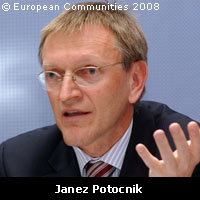Potocnik: ERA must be open to the world
The EU and its Member States must 'transform Europe's research labyrinth into a European Research Area open to the world, attracting the best brains and contributing to address global challenges', said European Science and Research Commissioner Janez Potocnik. Mr Potocnik was speaking at the launch of a new European strategy for international cooperation in science and technology. The strategy has two overarching goals: to integrate Europe's neighbours into the European Research Area (ERA) and foster cooperation in strategic areas with other key partner countries around the world; and to improve the overall framework conditions for international cooperation in science and technology. The document highlights the importance of coordinating Member-State and EU-level international cooperation activities. 'Global challenges call for global responses. There is no area where this is truer than science,' stated Commissioner Potocnik. 'Our international partners are attracted by Europe as a model of regional integration, but they are faced with a multitude of governmental actors and research priorities when they want to engage in concrete cooperation.' According to the strategy, if Europe is to become the research partner of choice internationally, it must ensure it has adequate, competitive research funding, top class infrastructures, enhanced mobility for researchers and appropriate intellectual property rules. The strategy underlines the importance of opening up the ERA to the rest of the world. It notes that many of Europe's neighbours are now fully associated to the Seventh Framework Programme (FP7), meaning their researchers can compete for funding on an equal footing with researchers from EU Member States. Bilateral science and technology agreements are important tools for strengthening links with countries that could one day be interested in full membership of the framework programmes. Furthermore, the Commission recommends that more efforts be made to provide reciprocal access to research funds through these agreements. The strategy also raises the possibility of a regional approach to international cooperation, which would entail working with bodies such as ASEAN (the Association of Southeast Asian Nations) or the African Union on joint initiatives. Research infrastructures also feature strongly in the new strategy. The European Strategy Forum on Research Infrastructures (ESFRI) has helped to initiate a debate on the world-class infrastructures which will be needed in the coming years, and plans to turn many of these into a reality are already well underway. Nevertheless, according to the strategy, a more structured approach to developing global research infrastructures is needed. Another section of the strategy addresses the issues surrounding researcher mobility. 'It is crucial that European researchers who work in a third country remain part of the ERA,' the strategy reads. Furthermore, researchers from developing countries who come to Europe should be encouraged [b1]to contribute to their own country's development. There is a strong focus on Information and Communication Technologies (ICTs) in the strategy. Europe is already a major exporter in this sector but more needs to be done to strengthen this position. 'At a time when telecommunications, the Internet, mobile telephony and television increasingly impact our lives and the EU economy, it is urgent to improve the effectiveness of the EU's international action in information and communication technologies,' said Viviane Reding, EU Commissioner for Information Society and Media. 'If Europe wants to maintain its position as a global leader in Science and Research, we need to find the most efficient ways to collaborate within the EU and to transform our willingness to cooperate with our partners worldwide (into action) while targeting our priorities.' This international cooperation strategy is the last in a series of five initiatives launched by the Commission with the aim of strengthening the ERA. The others, which concern the management of intellectual property by public research organisations; the promotion of research careers and researcher mobility; research infrastructures; and boosting cooperation between national research programmes, were launched earlier this year.



